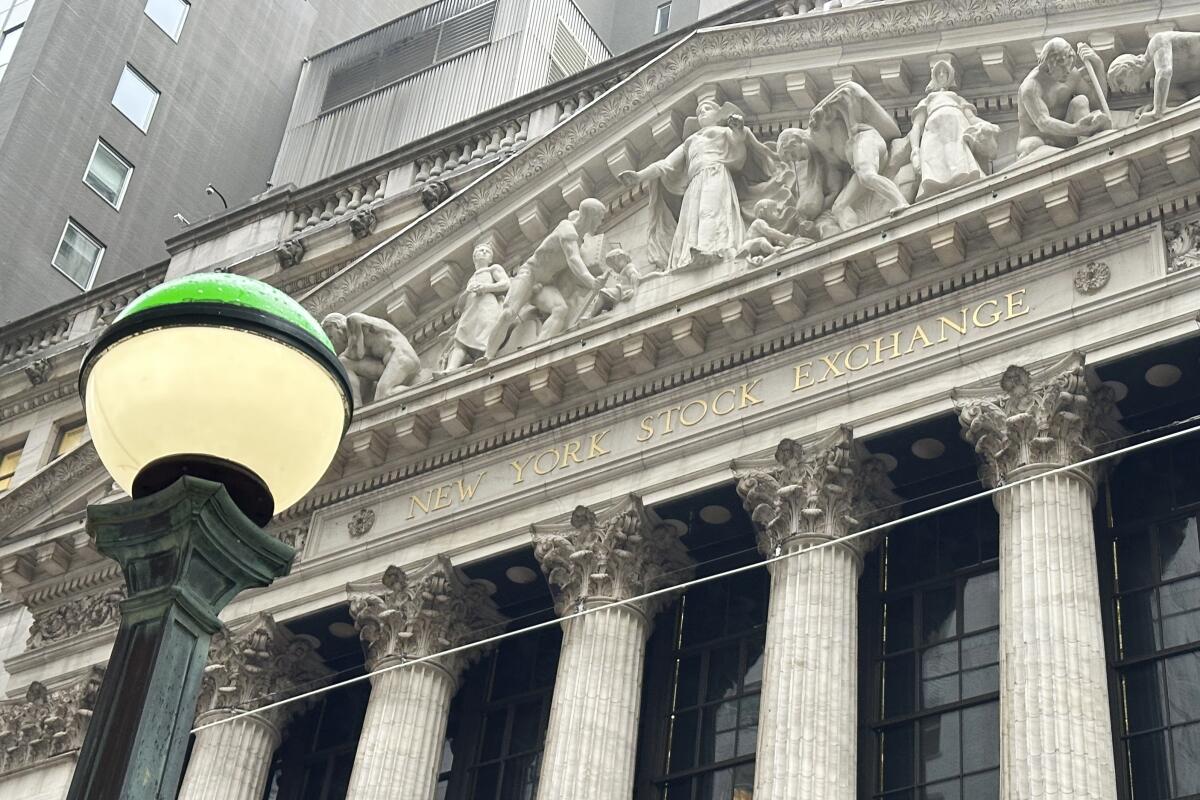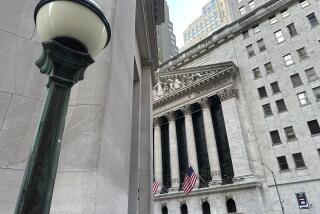Stock market today: Wall Street slumps as rising yields crank up the pressure

- Share via
NEW YORK — U.S. stocks slumped Monday after higher yields in the bond market caused by a strong U.S. economy cranked up the pressure on Wall Street.
The Standard & Poor’s 500 index tumbled 1.2%, following up on its 1.6% loss from last week, which was its worst since October. The Dow Jones industrial average dropped 0.7%, and the Nasdaq composite slumped 1.8%.
Stocks had been solidly higher earlier in the day, as oil prices eased with hopes that international efforts to calm escalating tensions in the Middle East may help. But Treasury yields also spurted upward after the latest report on the U.S. economy to blow past expectations.
The economy and financial markets are in an awkward phase where such strength raises hopes for growing profits at companies but also hurts prospects for easier interest rates from the Federal Reserve. They’re the two main levers that set stock prices, and they’re simultaneously yanking Wall Street in different directions.
Traders want lower interest rates, which can give the overall economy a boost, and much of the U.S. stock market’s run to records recently was built on expectations for cuts.
But strong reports such as Monday’s, which showed U.S. shoppers increased their spending at retailers last month by more than expected, have traders broadly forecasting just one or two cuts to rates this year, according to data from CME Group. That’s down from expectations for six or more cuts at the start of this year. Some traders are bracing for potentially no cuts because inflation and the overall economy have remained stubbornly above forecasts this year.
High interest rates and bond yields hurt prices for all kinds of investments, particularly those that look expensive or those that compete for the same kinds of investors that bonds do.
As a result, real estate investment trusts fell to some of Monday’s sharpest losses in the stock market. When bonds are paying higher yields, they peel away investors who might otherwise be interested in the relatively big dividends that real estate stocks pay. High rates can also pressure real estate prices broadly.
Office owner Boston Properties fell 3.2%, for example.
More influential was weakness for Big Tech stocks. Apple dropped 2.2%, Nvidia fell 2.5% and Microsoft sank 2%. They’ve been past beneficiaries of low interest rates and often feel pressure when yields are rising. Because they’re also the largest stocks on Wall Street, their movements carry extra weight on the S&P 500 and other indexes.
Microsoft, for example, swung from an early gain of 1.2% to its loss in the afternoon and was the second-largest force weighing on the S&P 500.
Helping to keep the losses in check were some financial companies that reported encouraging earnings for the start of the year. The pressure is on companies broadly to deliver fatter profits because interest rates look so much less likely to offer support in the near term.
Goldman Sachs rose 2.9% after its report.
M&T Bank climbed 4.7% after reporting profit for the first quarter that was slightly above analysts’ expectations. It also said it slightly shrank the amount of pain that it would take if the pressured commercial real-estate industry sinks sharply.
Charles Schwab rose 1.7% after also edging past analysts’ forecasts for its profit last quarter.
All told, the S&P 500 fell 61.59 points to 5,061.82. The Dow dropped 248.13 points to 37,735.11, and the Nasdaq composite sank 290.08 points to 15,885.02.
In the oil market, a barrel of U.S. crude for May delivery fell 25 cents to $85.41 as political leaders urged Israel not to retaliate after Iran’s attack on Saturday involving hundreds of drones, ballistic missiles and cruise missiles. Brent crude, the international standard, eased 35 cents to $90.10 per barrel.
Financial markets had been nervous heading into the weekend. The worry was that an attack by Iran could widen Israel’s war with Hamas and ultimately constrict the flow of crude oil. But Israel said 99% of the drones and missiles were intercepted as diplomats urged a de-escalation and the U.S. administration made clear it did not support a wider war with Iran.
This year’s jump in oil prices has been raising worries about a knock-on effect on inflation, which has remained stubbornly high. After cooling solidly last year, inflation has consistently come in above forecasts in each month so far of 2024.
“If inflation is sticky because of momentum in the economy, that’s not necessarily bad for stocks,” Bank of America strategists led by Ohsung Kwon wrote in a BofA Global Research report. “But stagflation is,” referring to the painful combination of a stagnating economy and high inflation.
Strategists at Wells Fargo Investment Institute raised their forecast for where the S&P 500 could end this year in part because of the surprising strength of the U.S. economy. While they expect stock prices to be choppy following big gains since October, they say a growing U.S. economy should drive sales for companies.
In the bond market, the yield on the 10-year Treasury rose to 4.61% from 4.52% late Friday.
Choe writes for the Associated Press. AP writers Matt Ott and Zimo Zhong contributed.
More to Read
Inside the business of entertainment
The Wide Shot brings you news, analysis and insights on everything from streaming wars to production — and what it all means for the future.
You may occasionally receive promotional content from the Los Angeles Times.










